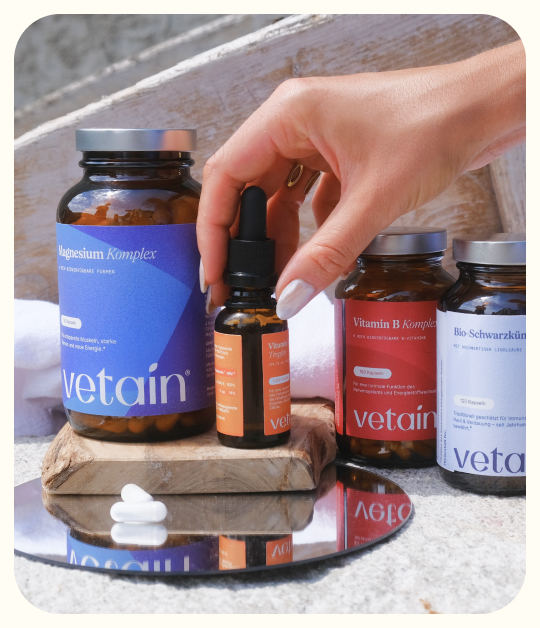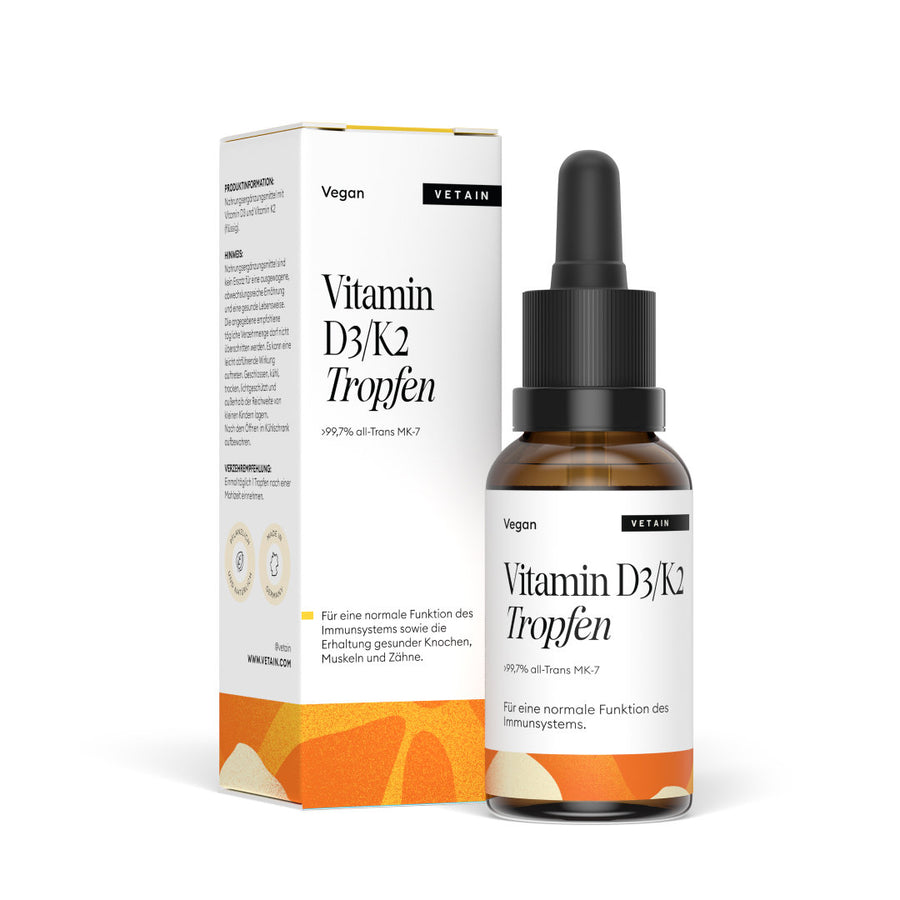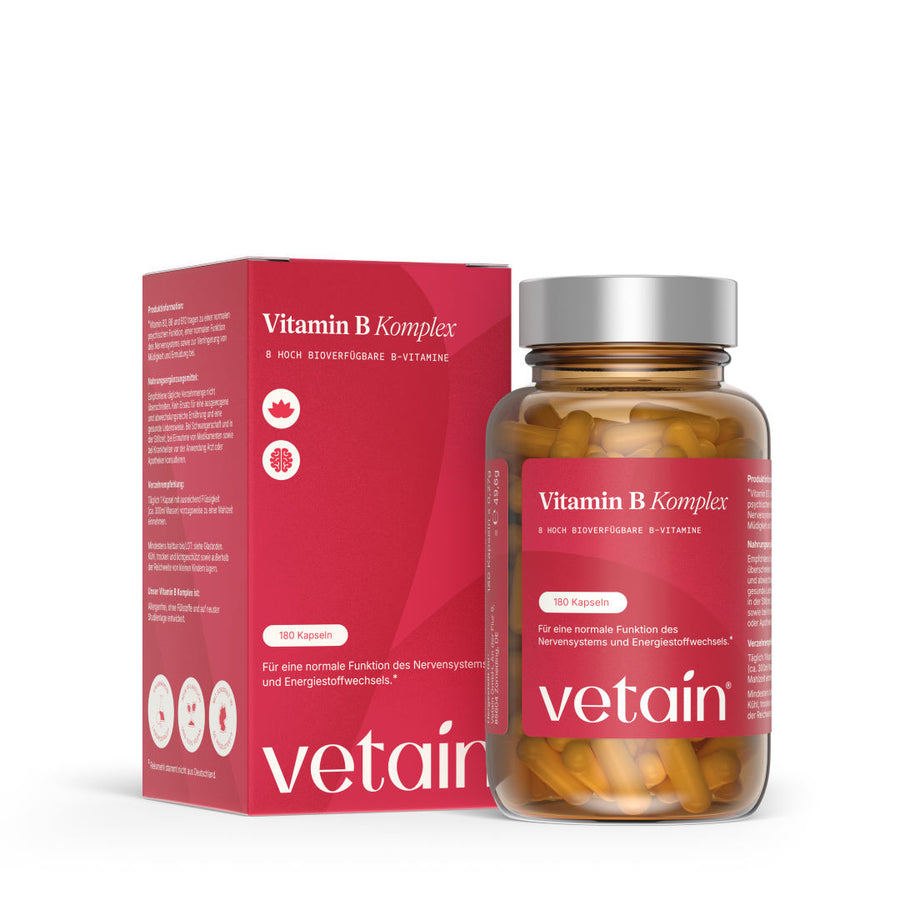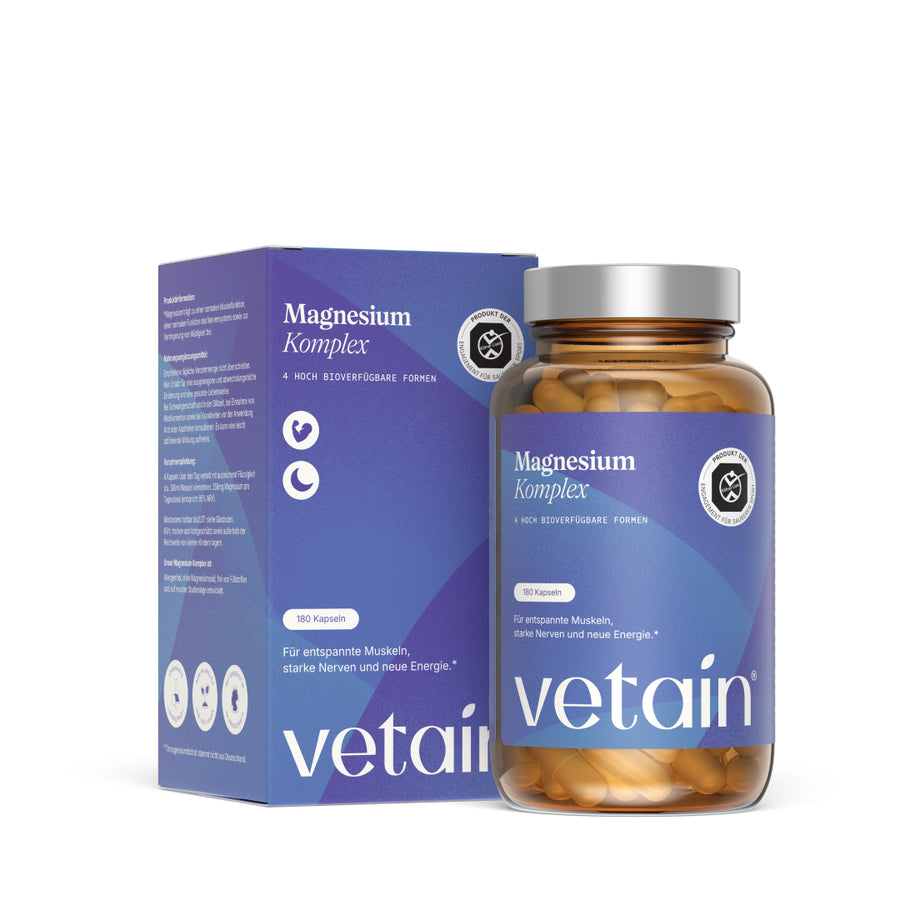Pill here, capsule there, and later a little powder. Sounds familiar? Understandable. In recent years, there has been a real supplement boom. Suddenly, they’re everywhere: at the pharmacy, in drugstores, and even at discount stores, shelves are packed with different options.
But often you stand in front of the shelves and can’t make sense of it all. This flood of products is overwhelming. And slowly but surely, a big question mark forms in your head: What are dietary supplements actually? And which supplements are important and suitable for me?
No worries, at Vetain we know this topic inside out and will give you an overview in this article. Soon you’ll be able to buy your daily supplements with confidence.
Your knowledge to go: What are dietary supplements?
Dietary supplements are nutrients like vitamins & minerals in concentrated form that can help ensure adequate nutrient intake – especially when diet alone doesn’t do the job.
Which supplements are useful is highly individual and depends on lifestyle, life stage, and diet.
A conscious and responsible use of supplements is important.
Definition
So, what are dietary supplements?
In short, dietary supplements are measured nutrients in concentrated form that can influence the body or nutritional status. This means that nutrients such as vitamins or minerals are packed into small pills, powders, capsules, effervescent or other tablets, and juices. This way, they can contribute to adequate nutrient supply – especially when diet alone is insufficient.
What are the most common dietary supplements?
Vitamins
Minerals
Secondary plant compounds
Amino acids
Enzymes
Fatty acids
…
%-product_content-%
If you’re now thinking, great, then I’ll just eat pizza and chocolate all day and get my nutrients through supplements, I have to disappoint you. Supplements (short: NEM or supplements) are no substitute for a healthy diet, but only a supplement! This means they can play a role in areas where diet falls short – but they are no alternative to fruits and vegetables.
By the way: Did you know that supplements are classified as foods and are therefore clearly distinguished from medicines?
Medicines vs. supplements
Before we continue with the question “Why supplements?”, let’s take a short detour into medicines vs. supplements.
What exactly are dietary supplements and medicines? What are supplements used for, and what’s the difference compared to medication?
Supplements (as the name suggests) complement our diet when certain nutrients are not consumed in sufficient amounts.
Taking supplements can therefore help ensure we are adequately supplied with nutrients. However, supplements themselves cannot cure diseases – unlike medicines. So supplements are not made for the treatment of diseases.
Who needs dietary supplements?
Now we know what supplements are – and what they are not. Next question: Why take supplements?
Nutrients like vitamins and minerals can usually be obtained through a balanced diet. However, there are situations where it’s not that easy, or even impossible, to cover nutrient needs through diet alone. Situations where diet is simply not enough because our body’s requirements are higher than what we can provide through food.
In exactly such cases, supplements come into play: they can help provide your body with the nutrients it needs.
Special life circumstances & stages:
Pregnant & breastfeeding women (there are even special supplements for women)
Infants & (small) children
Seniors
…
Special lifestyles:
Vegan diet (there are many plant-based supplements)
Active athletes
…
As you can see, not everyone needs supplements, but they can be useful for many. Now you may be wondering: Which supplements are important for me?
When should you take supplements?
Sorry, unfortunately we can’t give a one-size-fits-all answer. Because: Whether and which supplements you need is very individual. Depending on lifestyle, life stage, and diet, supplements can be more or less useful for you.
But we can give you some tips to better assess the situation:
Do you belong to one of the groups mentioned above? If so, check trusted sources for more information.
Observe your diet and track your nutrients. What do you regularly not get enough of? These could be signs that supplementation may be useful. Reference values (how much of a nutrient you should consume) can be found at the DGE.
Listen to your body: Are you constantly tired and exhausted? Do you often get sick? These can (but don’t have to!) be signs of nutrient deficiency.
Get advice: A medical check-up and professional consultation with nutrition experts or in a pharmacy can help.
Here you can learn which supplements may be right for you: Which supplements should you take?
Also interesting: Are supplements really necessary?
Risks and side effects
Wait, are supplements dangerous? Just a few vitamins – that doesn’t sound like a big deal. After all, we’re always told to eat more fruits and vegetables to get enough vitamins. Well, it’s not quite that simple. Supplements can indeed have risks and side effects.
Risks of supplements include:
Risk of overdose: Too much of a good thing can cause symptoms like stomach pain, nausea, or worse. Always follow dosage recommendations – there’s a reason they’re on the package! ;)
Insufficient product quality: Contaminated products, low-quality ingredients, intolerable additives, or overly high dosages. Although there are regulations for supplement manufacturers, there are unfortunately still many misleading products.
Interactions: Some supplements can interact with each other or with medications, leading to unwanted effects.
Multivitamins and combination products: These contain many different vitamins and minerals, often more than you actually need. It’s usually better to take single or individually useful combinations instead.
Ultimately, you also determine how risky supplements are for you. Even the best product can have negative effects if used incorrectly or misused. A responsible approach and sufficient research are therefore essential.
Guide: Finding good supplements
With so much choice, finding a good product can be tricky. What should you look out for when buying? What are good supplements? And which ones should you avoid?
Here’s a checklist for good products:
Quality seals and certifications
A clean and short ingredient list
Trustworthy origin
Official product tests and reviews
Transparency and contact: Good manufacturers are always there for you and don’t shy away from responsibility.
Clear dosage instructions and sensible amounts
By the way: Doctors, nutritionists, and pharmacists are happy to advise you and answer product-related questions.
One last tip: If you read something like “miracle cure” or “healing” on the package – run! Far, far away.
%-split_content-%
Conclusion: What are dietary supplements?
Supplements complement a balanced diet and can help us get enough vitamins, minerals & co. Who needs which supplements is highly individual.
Hopefully, you now have a clearer understanding of what dietary supplements are!
Literature
EFSA (Europäische Behörde für Lebensmittelsicherheit. (o. J.). Nahrungsergänzungsmittel. https://www.efsa.europa.eu/
de/topics/topic/food-
supplementsArbeitskreis Nahrungsergänzungsmittel im Lebensmittelverband Deutschland e.V. (2023). Nahrungsergänzungsmittel – die wichtigsten Fakten. https://www.lebensmittelverband.de
/fileadmin/Publikationen/Broschueren_
Flyer/2023/06/AK_NEM_Brochure_2023
_WEB_final.pdfBVL (Bundesamt für Verbraucherschutz und Lebensmittelsicherheit). (o.J.) Nahrungsergänzungsmittel. https://www.bvl.bund.de/
DE/Arbeitsbereiche/01_Lebensmittel
/03_Verbraucher/04_NEM/NEM_
node.htmlBZfE (Bundeszentrum für Ernährung) in der Bundesanstalt für Landwirtschaft und Ernährung (BLE); Seeher, J.; Thiesmeier-Dormann, C. & Schmidt-Packmohr, C. (2023). Vitamine, Mineralstoffe und Co. Wann ist eine Nahrungsergänzung sinnvoll? In: Kompass Ernährung, 27(1).
Do you have questions? Then feel free to send me an email – I look forward to hearing from you! :)
The information shared in this article does not replace individual medical or nutritional advice.















 8 Min
8 Min
 Zuletzt aktualisiert am 30.10.2025
Zuletzt aktualisiert am 30.10.2025





